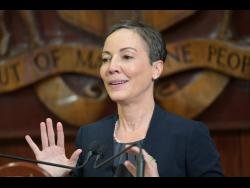Jamaica’s Concern Over U.S. Visa Restrictions on Cuban Healthcare Workers
In a recent development that has stirred conversations across the Caribbean, Jamaica’s Minister of Foreign Affairs and Foreign Trade, Senator Kamina Johnson Smith, expressed the government’s concerns regarding the United States’ new visa restriction policy. This policy specifically targets officials from countries that engage with Cuban healthcare workers, a move that has raised eyebrows in Jamaica and beyond.
“Jamaica has had quite a long history of participation in the Cuban medical cooperation programme, and in fact, that is replicated throughout the Caribbean, so the statement has been received with some concern,” Johnson Smith stated during a post-Cabinet press briefing at Jamaica House. Her words reflect the deep-rooted relationship Jamaica shares with Cuba in the realm of healthcare, a partnership that has been beneficial for many years.
Last week, U.S. Secretary of State Marco Rubio announced an expansion of the visa restrictions, which now includes foreign government officials and their families from countries involved in Cuba’s overseas medical mission programme. Rubio, who has Cuban American roots, described these missions as oppressive, claiming they enrich the Cuban government while depriving ordinary Cubans of adequate healthcare. This perspective has sparked a debate about the implications of such a policy on countries like Jamaica that rely on Cuban medical professionals.
The Jamaican government is not taking this lightly. Johnson Smith revealed that they, along with other Caribbean Community (CARICOM) members, are actively seeking clarification from the U.S. regarding the new policy. “The Jamaican government is also examining the operation of our system. We have over 400 participants from the Cuban medical programme at different levels—doctors, nurses, biomedical engineers, and technicians—so their presence here is of importance to our healthcare system,” she explained.
The presence of Cuban healthcare workers in Jamaica has been a lifeline for many communities, especially in rural areas where medical resources are often scarce. These professionals have been instrumental in providing essential healthcare services, and their potential removal due to visa restrictions could have serious repercussions on the quality of care available to Jamaicans.
In light of these developments, Johnson Smith announced that a meeting is on the horizon with CARICOM foreign affairs ministers. This gathering aims to discuss the implications of the U.S. policy and to gather more information from U.S. embassies across the region. “At that time, we should be better able to navigate the potential impact and the way forward,” she noted, emphasizing the need for a united Caribbean response.
The sentiment among citizens is mixed. Some express concern about the potential loss of valuable healthcare resources, while others echo Rubio’s sentiments regarding the Cuban government’s practices. The debate continues, with many wondering how this policy will affect not just Jamaica but the entire Caribbean region.
As the Jamaican government navigates these uncharted waters, one thing is clear: the relationship with Cuba in healthcare is not just a matter of policy; it’s about the lives and well-being of countless Jamaicans. How will the government respond to ensure that healthcare remains accessible and effective for all? Only time will tell.

